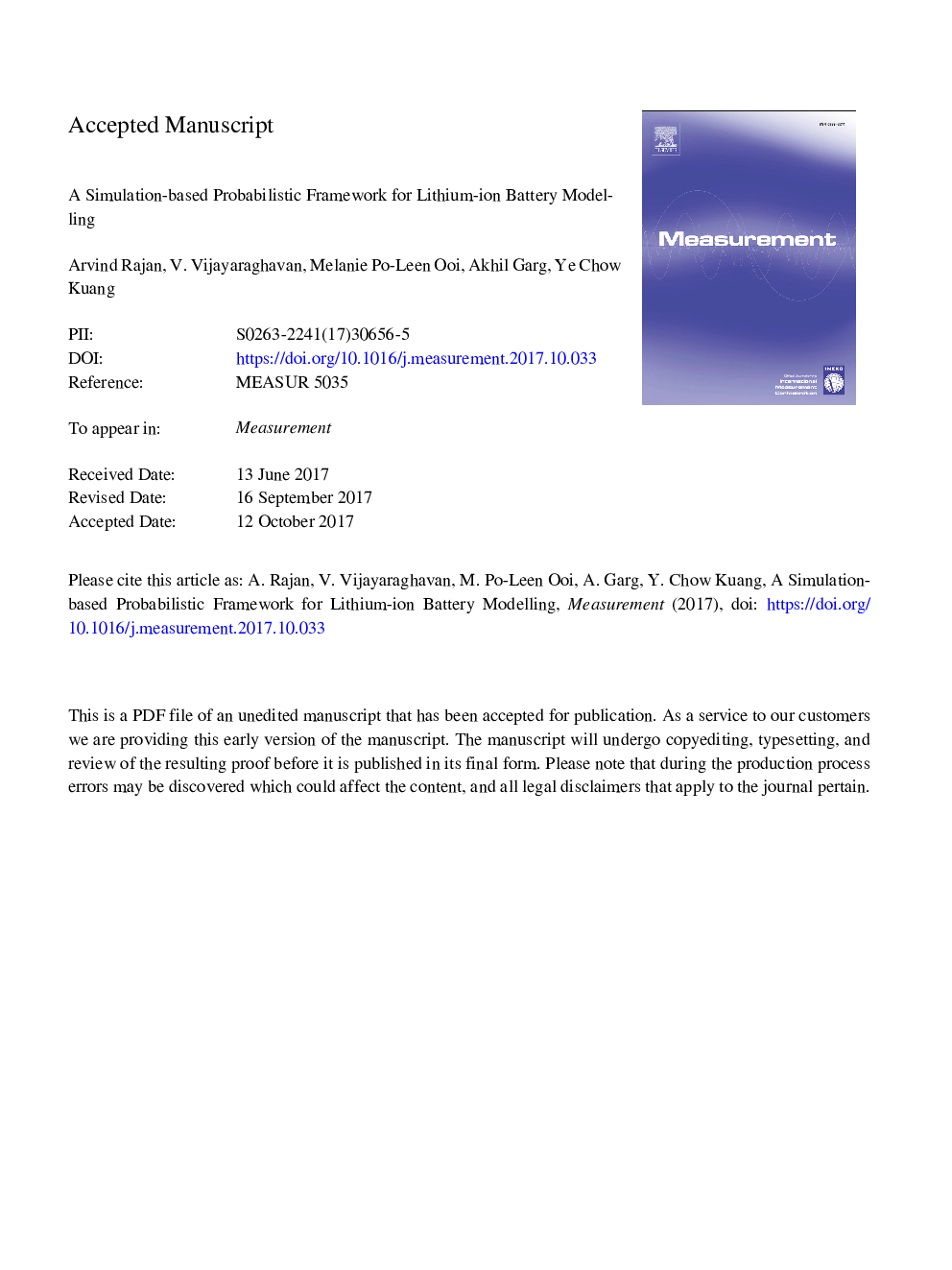| کد مقاله | کد نشریه | سال انتشار | مقاله انگلیسی | نسخه تمام متن |
|---|---|---|---|---|
| 7121975 | 1461472 | 2018 | 25 صفحه PDF | دانلود رایگان |
عنوان انگلیسی مقاله ISI
A simulation-based probabilistic framework for lithium-ion battery modelling
ترجمه فارسی عنوان
چارچوب احتمالاتی مبتنی بر شبیه سازی برای مدل سازی باتری های لیتیوم یون
دانلود مقاله + سفارش ترجمه
دانلود مقاله ISI انگلیسی
رایگان برای ایرانیان
کلمات کلیدی
المان محدود، شبیه سازی، عدم قطعیت، تجزیه و تحلیل احتمالی، قابلیت اطمینان، بسته باتری،
ترجمه چکیده
تحقیقات دولت در مورد مدل سازی باتری های لیتیوم یون برای وسیله نقلیه الکتریکی بر اساس مدل های مبتنی بر فیزیک و تجربی برای تخمین وضعیت آنها انجام شده است. با این حال، توجه کمتر به ارزیابی قدرت مکانیکی باتری ها زمانی که بسته باتری تحت تاثیر ناگهانی خارجی یا سقوط قرار می گیرد. بنابراین، کار حاضر، یک چارچوب احتمالی مبتنی بر شبیه سازی را ارائه می دهد که ترکیبی از شبکه های عصبی مصنوعی و یک روش ارزیابی عدم قطعیت مبتنی بر لحظه ای با استفاده از مدل عنصر محدودی باتری لیتیوم یونی برای ارزیابی مقاومت مکانیکی آن است. این مطالعه بر اساس ورودی های زیر است: جابجایی، درجه حرارت و میزان فشار باتری و عدم اطمینان آنها زمانی که باتری تحت تاثیر ناگهانی قرار می گیرد. شبکه عصبی مصنوعی از دیگر مدلهای شناخته شده مدلسازی مانند شبکهای عصبی با قابلیت شعاعی و رگرسیون چندجملهای برای مدلسازی استحکام مکانیکی جهانی بهره میبرد و توزیع احتمال به دست آمده از روش ارزیابی عدم قطعیت پیشنهاد شده دقیق است. تجزیه و تحلیل بیشتر با استفاده از چارچوب نشان می دهد که میانگین قدرت مکانیکی باتری با افزایش دمای کاهش می یابد، اما با افزایش جابه جایی و نرخ کرنش افزایش می یابد. همچنین مشخص شد که جابجایی و دما به طور مشابه تاثیر زیادی بر مقاومت مکانیکی باتری در مقایسه با میزان فشار دارد. چارچوب پیشنهادی و یافته های ارائه شده می تواند به تولیدکنندگان باتری به منظور بهبود ایمنی جاده وسایل نقلیه الکتریکی کمک کند.
موضوعات مرتبط
مهندسی و علوم پایه
سایر رشته های مهندسی
کنترل و سیستم های مهندسی
چکیده انگلیسی
State-of-the-art researches on the modelling of lithium-ion batteries for electric vehicle have been conducted based on the physics and empirical-based models to estimate their states. However, less attention has been paid to evaluating the mechanical strength of the batteries when the battery pack is subjected to sudden external impact or crash. The present work, therefore, proposes a simulation-based probabilistic framework that combines artificial neural network and a moment-based uncertainty evaluation technique utilising the finite element model of a lithium-ion battery to evaluate its mechanical strength. The study was based on the following inputs: displacement, temperature and strain rate of the battery, and their uncertainties when the battery is subjected to sudden impact. The artificial neural network outperforms other well-known modelling methods, such as the radial basis function neural network and polynomial regression, for the global mechanical strength modelling, and the probability distribution obtained from the proposed uncertainty evaluation procedure is shown to be accurate. Further analysis employing the framework reveals that the mean mechanical strength of the battery decreases with increasing temperature, but increases with increasing displacement and strain rate. It was also found that the displacement and temperature have similarly high influence on the mechanical strength of the battery compared to the strain rate. The proposed framework and presented findings can help battery manufacturers improve the road safety of electric vehicles.
ناشر
Database: Elsevier - ScienceDirect (ساینس دایرکت)
Journal: Measurement - Volume 115, February 2018, Pages 87-94
Journal: Measurement - Volume 115, February 2018, Pages 87-94
نویسندگان
Arvind Rajan, V. Vijayaraghavan, Melanie Po-Leen Ooi, Akhil Garg, Ye Chow Kuang,
